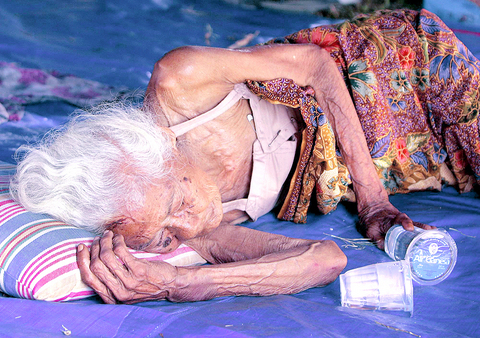Lack of funds has crippled the creation of a tsunami warning system, leaving earthquake-prone Indonesia without a single working detection buoy, an official said yesterday, a day after a tsunami killed more than 340 people.
No sirens alerted residents in Pangandaran beach, the worst-hit area of Monday's tsunami, after a 7.7 magnitude quake struck 180km offshore in the Indian Ocean.
Edi Prihantoro, an official at the Ministry of Research and Technology that oversees a national warning project, said the southern Java area had no system to warn people of coming waves.

PHOTO: AP
Indonesia deployed two tsunami buoys last year off Sumatra, part of a five-year project to install similar detectors all around the world's largest archipelago.
But when asked how many of them were operational, Prihantoro said: "None."
"We need at least 22 buoys to cover all of Indonesia. We have received two from Germany and they were deployed months ago. However, both of them are damaged now," he said.
Both have since been removed from the sea and one buoy is sitting in a warehouse in west Sumatra awaiting repairs.
The death in a dozen Indian Ocean countries of more than 230,000 people -- more than two-thirds in Indonesia's Aceh Province -- from a huge tsunami in December 2004 prompted international calls for a global warning system.
Indonesia was the worst hit by the 2004 tsunami, and Monday's disaster shows how unprepared the nation remains in dealing with the threat of tsunamis.
However, Science and Technology Minister Kusmayanto Kadiman admitted yesterday that the government had received warnings from the Pacific Tsunami Warning Center and Japan's Meteorological Agency that Monday's quake had the potential to trigger a tsunami -- but it did not attempt to pass them on to threatened communities.
"If it [the tsunami] did not occur, what would have happened?" he said to reporters in Jakarta, without elaborating.
The alerts were sent around 45 minutes before the tsunami struck.

CHIP WAR: The new restrictions are expected to cut off China’s access to Taiwan’s technologies, materials and equipment essential to building AI semiconductors Taiwan has blacklisted Huawei Technologies Co (華為) and Semiconductor Manufacturing International Corp (SMIC, 中芯), dealing another major blow to the two companies spearheading China’s efforts to develop cutting-edge artificial intelligence (AI) chip technologies. The Ministry of Economic Affairs’ International Trade Administration has included Huawei, SMIC and several of their subsidiaries in an update of its so-called strategic high-tech commodities entity list, the latest version on its Web site showed on Saturday. It did not publicly announce the change. Other entities on the list include organizations such as the Taliban and al-Qaeda, as well as companies in China, Iran and elsewhere. Local companies need

CRITICISM: It is generally accepted that the Straits Forum is a CCP ‘united front’ platform, and anyone attending should maintain Taiwan’s dignity, the council said The Mainland Affairs Council (MAC) yesterday said it deeply regrets that former president Ma Ying-jeou (馬英九) echoed the Chinese Communist Party’s (CCP) “one China” principle and “united front” tactics by telling the Straits Forum that Taiwanese yearn for both sides of the Taiwan Strait to move toward “peace” and “integration.” The 17th annual Straits Forum yesterday opened in Xiamen, China, and while the Chinese Nationalist Party’s (KMT) local government heads were absent for the first time in 17 years, Ma attended the forum as “former KMT chairperson” and met with Chinese People’s Political Consultative Conference Chairman Wang Huning (王滬寧). Wang

CROSS-STRAIT: The MAC said it barred the Chinese officials from attending an event, because they failed to provide guarantees that Taiwan would be treated with respect The Mainland Affairs Council (MAC) on Friday night defended its decision to bar Chinese officials and tourism representatives from attending a tourism event in Taipei next month, citing the unsafe conditions for Taiwanese in China. The Taipei International Summer Travel Expo, organized by the Taiwan Tourism Exchange Association, is to run from July 18 to 21. China’s Taiwan Affairs Office spokeswoman Zhu Fenglian (朱鳳蓮) on Friday said that representatives from China’s travel industry were excluded from the expo. The Democratic Progressive Party government is obstructing cross-strait tourism exchange in a vain attempt to ignore the mainstream support for peaceful development

ELITE UNIT: President William Lai yesterday praised the National Police Agency’s Special Operations Group after watching it go through assault training and hostage rescue drills The US Navy regularly conducts global war games to develop deterrence strategies against a potential Chinese invasion of Taiwan, aimed at making the nation “a very difficult target to take,” US Acting Chief of Naval Operations James Kilby said on Wednesday. Testifying before the US House of Representatives Armed Services Committee, Kilby said the navy has studied the issue extensively, including routine simulations at the Naval War College. The navy is focused on five key areas: long-range strike capabilities; countering China’s command, control, communications, computers, cyber, intelligence, surveillance, reconnaissance and targeting; terminal ship defense; contested logistics; and nontraditional maritime denial tactics, Kilby